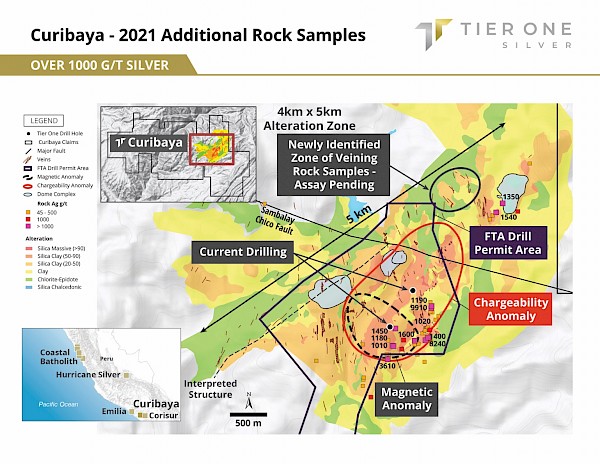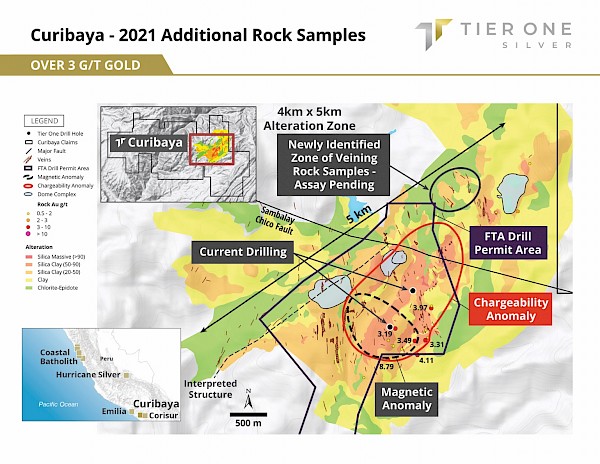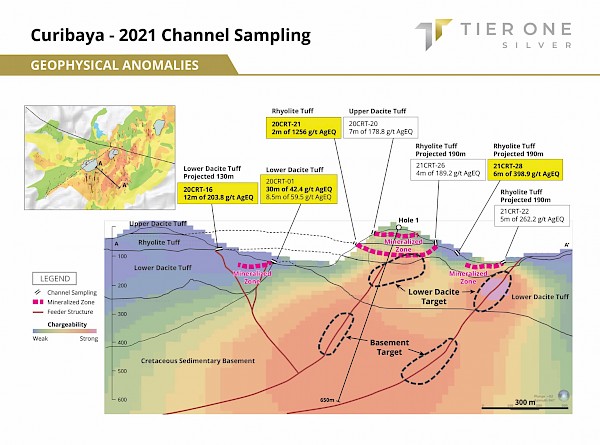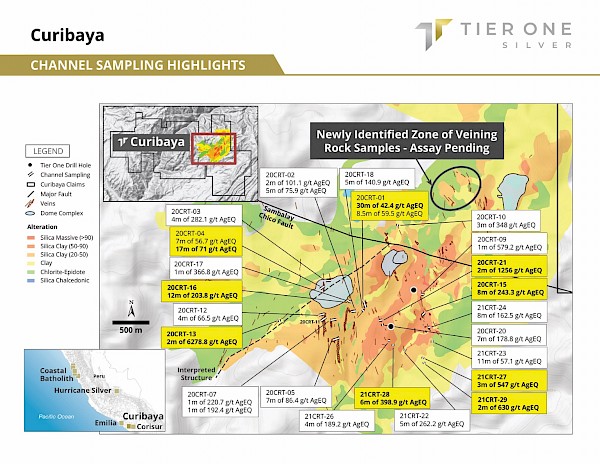Vancouver, Canada – August 6, 2021 – Tier One Silver (TSXV: TSLV, OTCQB: TSLVF) (“Tier One” or the “Company”) is pleased to announce initial channel samples and additional rock samples from its Curibaya project in southern Peru. Channel sample highlights include 2 metres (m) of 6,278 g/t silver equivalent (AgEq), 2 m of 1,256 g/t AgEq, 6 m of 398 g/t AgEq, 12 m of 203 g/t AgEq and 17 m of 71 g/t AgEq. These results demonstrate both high-grade vein and disseminated styles of mineralization within the 4 kilometre (km) by 5 km alteration system that currently defines the mineralized system at the project (Figure 1). In addition, selective rock sampling from newly identified veins on surface has yielded 11 samples over 1,000 g/t silver with a peak assay of 9,910 g/t silver (Figure 2 - 3). Gold values from the sampled veins yielded 13 samples above 1 g/t with a peak value of 8.79 g/t. Channel sampling and rock grab highlights are presented below in Tables 1 & 2.
A Message from Peter Dembicki, President, CEO & Director:
“The Curibaya project continues to deliver high-grade results as the mineralized footprint strengthens and expands. While we wait for our first ever drill results, which are expected in the coming weeks, we are also expanding our exploration efforts through additional geophysical and surface programs throughout the entire property.”
Significance of Channel Sampling Results:
The channel sampling results demonstrate the presence of high-grade vein structures and disseminated styles of mineralization. The ongoing drill program at the project is targeting both styles of mineralization based on extensive geologic mapping, geophysical resistivity and chargeability signatures where steeply dipping feeder structures and horizontal bodies of mineralization occur. The channel samples being reported are situated within several sub-horizontal mineralized bodies that have been mapped on surface within three distinct units within the upper Toquepala volcanic sequence (Figure 4). Importantly, Tier One’s technical team believes there is an opportunity to find additional sub-horizontal bodies of mineralization emanating from high angle feeder structures both within the poorly exposed lower Toquepala volcanic sequence and underlying sedimentary basement stratigraphy. Collectively, the surface channel sampling results demonstrate that cohesive bodies of mineralization are present on the project over considerable widths and that the drill targets of the shallow flat lying chargeability anomalies under the channel samples have the potential to yield significant zones of precious metal mineralization.
A Message from David Smithson, SVP of Exploration:
“We are very excited about the potential we’ve identified at Curibaya to-date. We strongly believe that the project can deliver a world-class discovery based on the extensive data that we have collected. We continue to find new outcropping mineralization in strong stockwork veining in areas that have never been sampled, north of our current target area, demonstrating the potential of the system.”
Selective Rock Sampling:
Selective sampling of veins continues to yield high-grade silver and gold values within the southwest region of the large-scale chargeability anomaly, where drilling is currently focused (Figures 2 - 3). The new veins sampled in this region range from below detection to a maximum of 9,910 g/t silver and 8.79 g/t gold. Collectively, these samples have increased the vein density and strengthened the underlying drill targets in this area of the project. In addition, a new zone of veining has been identified to the north of the limits of the chargeability anomaly that is approximately 500 m by 500 m. This newly identified zone of veining has expanded the hydrothermal system to the northeast with assay results pending.
Table 1: Channel sampling highlights
| Sample ID | From (m) | To (m) | Length (m) | AgEq (g/t) | Ag (g/t) | Au (g/t) |
|---|---|---|---|---|---|---|
| 20CRT-13 | 2 | 4 | 2 | 6,278.8 | 6,253.2 | 0.36 |
| 20CRT-21 | 9 | 11 | 2 | 1,256.0 | 747.2 | 7.05 |
| 20CRT-01 | 0 | 30 | 30 | 42.4 | 35.6 | 0.09 |
| 67 | 75.5 | 8.5 | 59.5 | 50.4 | 0.13 | |
| 20CRT-04 | 0 | 7 | 7 | 56.7 | 51.8 | 0.07 |
| 18 | 35 | 17 | 71.0 | 59.7 | 0.16 | |
| 20CRT-15 | 0 | 8 | 8 | 243.3 | 224.6 | 0.26 |
| 20CRT-16 | 2 | 14 | 12 | 203.8 | 174.6 | 0.40 |
| 21CRT-27 | 1 | 4 | 3 | 547.0 | 523.2 | 0.33 |
| 21CRT-28 | 0 | 6 | 6 | 398.9 | 354.2 | 0.62 |
| 21CRT-29 | 2 | 4 | 2 | 630.0 | 621.0 | 0.13 |
| 20CRT-02 | 33 | 35 | 2 | 101.1 | 61.8 | 0.54 |
| 43 | 48 | 5 | 75.9 | 57.7 | 0.25 | |
| 20CRT-03 | 34 | 38 | 4 | 282.1 | 233.3 | 0.67 |
| 20CRT-05 | 17 | 29 | 12 | 27.4 | 21.6 | 0.08 |
| 47 | 51 | 4 | 45.8 | 31.9 | 0.19 | |
| 56 | 63 | 7 | 86.4 | 65.5 | 0.29 | |
| 20CRT-07 | 4 | 5 | 1 | 220.7 | 173.0 | 0.66 |
| 30 | 31 | 1 | 192.4 | 165.0 | 0.38 | |
| 53 | 63 | 10 | 31.0 | 24.4 | 0.09 | |
| 70 | 78 | 8 | 36.2 | 27.7 | 0.12 | |
| 20CRT-09 | 0 | 6 | 6 | 38.0 | 35.7 | 0.03 |
| 14 | 15 | 1 | 579.2 | 572.0 | 0.10 | |
| 20CRT-10 | 2 | 5 | 3 | 348.0 | 324.4 | 0.33 |
| 20CRT-11 | 43 | 48 | 5 | 38.0 | 23.6 | 0.20 |
| 20CRT-12 | 8 | 16 | 8 | 25.0 | 18.8 | 0.09 |
| 51 | 55 | 4 | 66.5 | 44.3 | 0.31 | |
| 20CRT-17 | 2 | 3 | 1 | 366.8 | 265.0 | 1.41 |
| 20CRT-18 | 0 | 5 | 5 | 140.9 | 89.6 | 0.71 |
| 20CRT-20 | 0 | 7 | 7 | 178.8 | 152.9 | 0.36 |
| 21CRT-22 | 1 | 6 | 5 | 262.2 | 196.6 | 0.91 |
| 21CRT-23 | 0 | 11 | 11 | 57.1 | 55.0 | 0.03 |
| 21CRT-24 | 1 | 9 | 8 | 162.5 | 149.0 | 0.19 |
| 21CRT-26 | 1 | 5 | 4 | 189.2 | 161.4 | 0.38 |
| No less than 5m of >= 25ppm AgEq (or shorter intervals with linear grade >=125ppm*m), maximum consecutive dilution 6m Metal price used for Eq calculations: Au $1,300/oz, Ag $18/oz |
||||||
Table 2: Rock grab highlights
| Sample ID | Ag g/t | Sample ID | Ag g/t | Sample ID | Ag g/t | Sample ID | Au g/t |
|---|---|---|---|---|---|---|---|
| Y181603 | 9,910 | Y181454 | 488 | Y181606 | 133 | Y181286 | 8.79 |
| Y181552 | 8,240 | Y181556 | 482 | Y181247 | 127 | Y181320 | 4.11 |
| Y181286 | 3,610 | Y181555 | 422 | Y180986 | 117 | Y181603 | 3.97 |
| Y181342 | 1,600 | Y181607 | 414 | Y181285 | 110 | Y181342 | 3.49 |
| Y180989 | 1,540 | Y181320 | 374 | Y181559 | 69.5 | Y181552 | 3.31 |
| Y181564 | 1,450 | Y181296 | 364 | Y180988 | 63.3 | Y181564 | 3.19 |
| Y181327 | 1,400 | Y181294 | 351 | Y181451 | 59.1 | Y181328 | 2.54 |
| Y181283 | 1,350 | Y181455 | 335 | Y181115 | 57.1 | Y181141 | 2.38 |
| Y181602 | 1,190 | Y181601 | 310 | Y181236 | 51 | Y181471 | 1.91 |
| Y181471 | 1,180 | Y181463 | 269 | Y181290 | 49.8 | Y181247 | 1.84 |
| Y181470 | 1,010 | Y181149 | 247 | Y181148 | 48.4 | Y181474 | 1.66 |
| Y181292 | 988 | Y181472 | 241 | Y181327 | 1.34 | ||
| Y181474 | 980 | Y181605 | 216 | Y181470 | 1.18 | ||
| Y181328 | 806 | Y180996 | 212 | Y181602 | 0.92 | ||
| Y181316 | 764 | Y181315 | 152 | Y180989 | 0.83 | ||
| Y181481 | 629 | Y181604 | 146 | Y181454 | 0.75 | ||
| Y181456 | 614 | Y181248 | 142 | Y180996 | 0.72 | ||
| Y181141 | 608 | Y181325 | 135 |
Figure 1: Illustrates the position of the channel samples within the 4 km by 5 km alteration system that defines the surficial mineralized footprint at the Curibaya project.

Figure 2: Illustrates the location of newly sampled high-grade silver-gold veins within the Curibaya alteration system as well as a newly identified zone of veining to the northeast of the defined chargeability anomaly.

Figure 3: Illustrates the location of newly sampled high-grade silver-gold veins within the Curibaya alteration system as well as a newly identified zone of veining to the northeast of the defined chargeability anomaly.

Figure 4: Illustrates multiple flat-lying mineralized bodies that have been channel sampled within three units of the Toquepala volcanic sequence: an upper dacite tuff, a rhyolite tuff and a lower dacite tuff. Chargeability anomalies within the lower dacite tuff and underlying basement are primary targets in the ongoing Curibaya drill program.
Michael Henrichsen (Chief Geologist), P.Geo is the QP who assumes responsibility for the technical contents of this press release.
ON BEHALF OF THE BOARD OF DIRECTORS OF TIER ONE SILVER INC.
Peter Dembicki
President, CEO and Director
For further information on Tier One Silver Inc., please contact Natasha Frakes, Vice President of Communications at (778) 729-0600 or [email protected].
About Tier One
Tier One Silver is an exploration company focused on creating value for shareholders and stakeholders through the discovery of world-class silver, gold and base metal deposits in Peru. The Company’s management and technical teams have a strong track record in raising capital, discovery and monetization of exploration success. The Company’s exploration assets in Peru include: Hurricane Silver, Emilia, Coastal Batholith, Corisur and the flagship project, Curibaya, which has commenced its first drill program. For more information, visit www.tieronesilver.com.
Channel Sampling
Analytical samples were taken from each 1-metre interval of channel floor resulting in approximately 2-3 kg of rock chips material per sample. Collected samples were sent to ALS Lab in Arequipa, Peru for preparation and then to Lima, Peru for analysis. All samples are assayed using 30 g nominal weight fire assay with atomic absorption finish (Au-AA25) and multi-element four acid digest ICP-AES/ICP-MS method (ME-MS61). Where MS61 results were greater or near 10000 ppm Cu, 10000 ppm Pb or 100 ppm Ag the assay were repeated with ore grade four acid digest method (Cu, Pb, Ag-OG62). Where OG62 results were greater or near 1500 ppm Ag the assay were repeated with 30 g nominal weight fire assay with gravimetric finish (Ag-GRA21). QA/QC programs for 2021 channel samples using internal standard and blank samples; field and lab duplicates indicate good overall accuracy and precision.
Silver equivalent grades (AgEq) were calculated using a $1300/oz gold price and $18/oz silver price. AgEq = Ag (ppm) + Au (ppm) * (Ag $/troy oz/Au $/troy oz). No metallurgy recovers were used for the AgEq calculation.
Rock Sampling
Approximately 2-3 kg of material was collected for analysis and sent to ALS Lab in Arequipa, Peru for preparation and then to Lima, Peru for analysis. All samples are assayed using 30 g nominal weight fire assay with ICP finish (Au-ICP21) and multi-element four acid digest ICP-AES/ICP-MS method (ME-MS61). Where ICP21 results were > 3 g/t Au the assay were repeated with 30 g nominal weight fire assay with gravimetric finish (Au-GRA21). Where MS61 results were greater or near 10,000 ppm Cu, 10,000 ppm Pb or 100 ppm Ag the assay were repeated with ore grade four acid digest method (Cu, Pb, Ag-OG62). Where OG62 results were greater or near 1500 ppm Ag the assay were repeated with 30 g nominal weight fire assay with gravimetric finish (Ag-GRA21). Where Ag-GRA21 results were greater or near 10,000 ppm Ag the assay were repeated with fire assay with gravimetric finish for concentrate (Ag-CON01). QA/QC programs for 2021 rock samples using company and lab duplicates, standards and blanks indicate good accuracy and precision in a large majority of standards assayed.
Forward Looking Information and General Cautionary Language
This news release contains forward-looking statements and forward-looking information within the meaning of Canadian securities legislation (collectively, “forward-looking statements”) that relate to the Company’s current expectations and views of future events. Any statements that express, or involve discussions as to, expectations, beliefs, plans, objectives, assumptions or future events or performance (often, but not always, through the use of words or phrases such as “will likely result”, “are expected to”, “expects”, “will continue”, “is anticipated”, “anticipates”, “believes”, “estimated”, “intends”, “plans”, “forecast”, “projection”, “strategy”, “objective” and “outlook”) are not historical facts and may be forward-looking statements and may involve estimates, assumptions and uncertainties which could cause actual results or outcomes to differ materially from those expressed in such forward-looking statements. No assurance can be given that these expectations will prove to be correct and such forward-looking statements included in this news release should not be unduly relied upon. These statements speak only as of the date of this news release. In particular and without limitation, this news release contains forward-looking statements regarding the Company’s exploration plans.
Neither the TSX Venture Exchange nor its Regulation Services Provider (as that term is defined in the policies of the TSX Venture Exchange) accepts responsibility for the adequacy or accuracy of this release.

